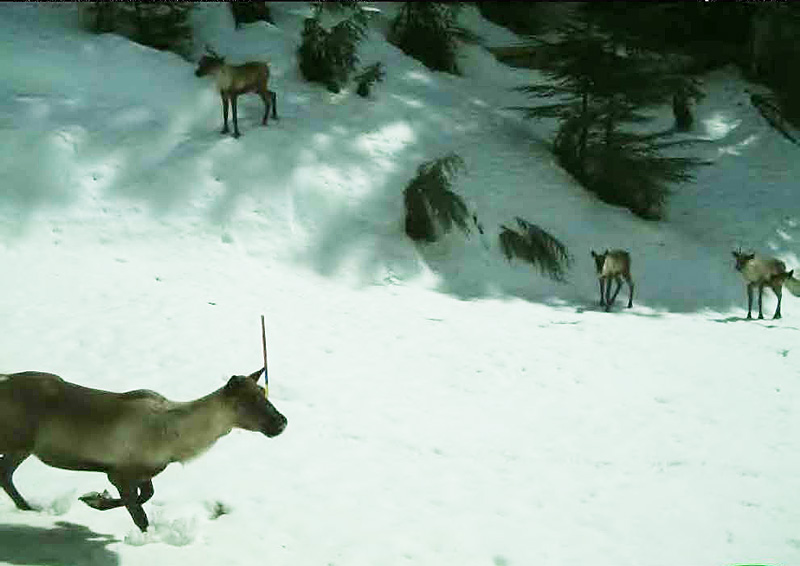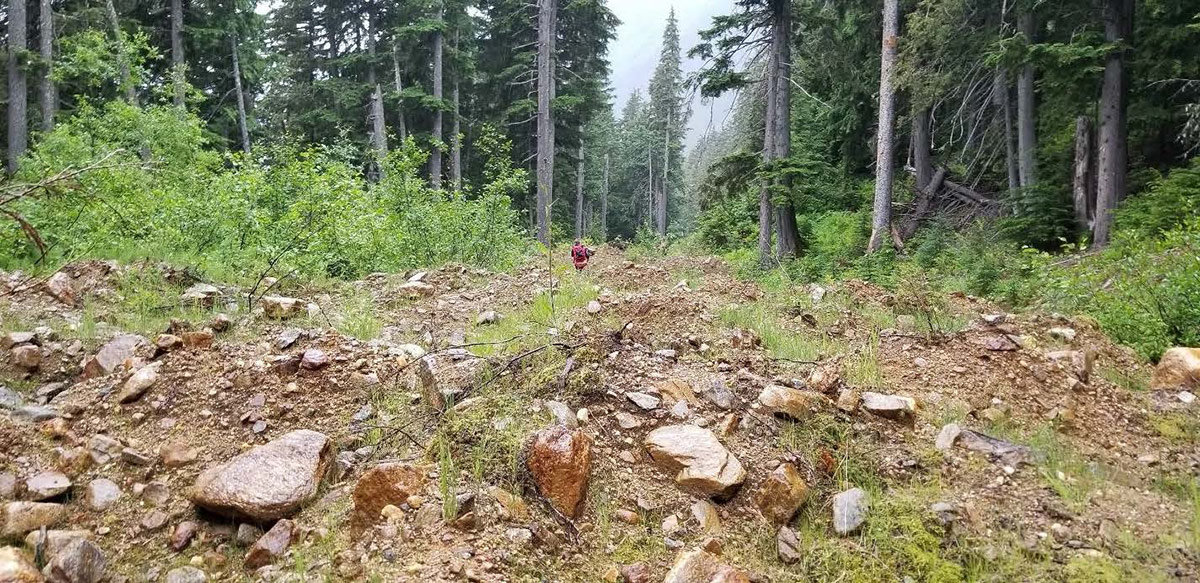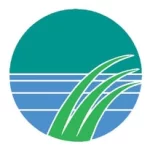VICTORIA – With funding from the B.C. government, the Habitat Conservation Trust Foundation has approved seven more projects that will help restore caribou habitat in British Columbia, through the organization’s Caribou Habitat Restoration Fund.
This round of grants totals almost $1.1 million (see details in list below). The Province has committed $8.5 million over three years to the foundation to support this type of work.
Human activity – such as forestry, mining, oil and gas, and roadbuilding work– has altered caribou habitat. Examples of activities that help restore caribou habitat include planting trees to restore areas to a pre-disturbed state and blocking former roads and other linear features such as seismic lines (corridors cleared of vegetation for oil and gas exploration) to reduce predator access.
For example, one of this year’s seven projects will expand on previous habitat restoration work done to benefit the Columbia North caribou herd near Revelstoke. With the support of a $33,217 grant, habitat is being restored along an 11.5-kilometre stretch of road in the area. Led by Yucwmenlúcwu, a Splatsin-owned resource management company, the project will add to the areas that were previously restored in the upper Bigmouth Valley north of Revelstoke.
Last year, the Yucwmenlúcwu project planted nearly 9,000 conifer seedlings along a five-kilometre stretch of road in the valley. The project team is actively monitoring the site to evaluate tree growth and survival and determine whether there have been any changes in the use of this land by caribou and other wildlife, including predators.
The Province initially provided $2 million to the Habitat Conservation Trust Foundation in April 2018 for a caribou habitat restoration program, and then committed another $6.5 million over three years as part of a multi-year agreement between the Province and the foundation. The goal then, as now, is to rehabilitate areas that have been prioritized for caribou recovery efforts. During its first public intake in 2019, the foundation funded 11 projects led by First Nations, government, industry and not-for-profit societies, worth about $1.2 million.
The Habitat Conservation Trust Foundation will be accepting applications for caribou habitat restoration projects again in September 2020. The 2020 intake will close on Nov. 6, 2020 at 4:30 p.m. (Pacific time). Further details are available here.

Caribou utilizing the Upper Bigmouth restoration area.
Quick Facts:
- Since its inception in 1981, the Habitat Conservation Trust Foundation has invested over $189 million in grants to support almost 3,000 conservation projects in B.C., with the goal of restoring, maintaining or enhancing native fish and wildlife populations and habitats
- The B.C. government has committed $47 million over three years to build a comprehensive, science-based approach to protect and preserve B.C.’s 54 caribou herds. Its recovery program aims to restore this iconic Canadian species to a sustainable population.
2020-21 CHRF Approved Project List
Middle-Upper Bigmouth Creek (Project #4-621)
- Led by Yucwmenlucwu (Caretakers of the Land) LLP
- Designed to benefit the Columbia North herd Kootenay Region (130 km north of Revelstoke)
- This project is planning the restoration of an additional 11.5 km of road in the Bigmouth valley
- Approved for $33,217 for 2020-21
- For more information, contact Corey Bird, Yucwmenlucwu (Caretakers of the Land) LLP
Email bird@splatsindc.com
Ulkatcho (Project #5-318)
- Led by the Ministry of Forests, Lands, Natural Resources and Rural Development (MFLNRORD)
- Designed to benefit the Itcha-Ilgachuz herd in the Cariboo Region (~30 km south east of Anahim Lake)
- Project will plant trees and creating barriers along roads to deter predator movement
- Approved for $314,572 for 2020-21
- For more information, contact Nathan Davis, MFLNRORD
Email Nathan.Davis@gov.bc.ca
Tweedsmuir Caribou Winter Range – Chelaslie Road Restoration (Project #6-283)
- Led by the Ministry of Forests, Lands, Natural Resources and Rural Development (MFLNRORD)
- Designed to benefit the Tweedsmuir-Entiako caribou (TEC) herd in the Skeena Region (60 km south of Burns Lake)
- Project will create barriers along roads to deter predator movement, plant trees and transplant lichen (a preferred food source of caribou)
- Approved for $385,960 for 2020-21
- For more information, contact Anne-Marie Roberts, MFLNRORD
Email roberts@gov.bc.ca
Amoco Road Restoration (Project #7-528)
- Led by the Nîkanêse Wah tzee Stewardship Society
- Designed to benefit the Moberly (Klinse-Za) and Scott East caribou herds in the Northeast Region (56 km west of Chetwynd)
- Project will plant trees and create barriers along a road built for oil and gas exploration
- Approved for $53,150 for 2020-21
- For more information, contact Tamara Dokkie, Nîkanêse Wah tzee Stewardship Society
Email: tamara.dokkie@westmo.org
Kotcho Lake Restoration Area (Project #7-529)
- Led by the Fort Nelson First Nation Lands Department
- Designed to benefit the Snake-Sahtahneh caribou herd in the Northeast region (approximately 80 km northeast of Fort Nelson)
- Project will limit predator use of legacy seismic lines (corridors cleared of vegetation for oil and gas exploration) and replant areas to increase habitat suitability for caribou
- Approved for $164,780 for 2020-21
- For more information, contactKatherine Wolfenden, Fort Nelson First Nation Lands Department Email kwolfenden@fnnation.ca
Peck Creek-Upper Carbon (Project #7-543)
- Led by the Nîkanêse Wah tzee Stewardship Society
- Designed to benefit the Moberly (Klinse-Za) and Scott East caribou herds in the Northeast Region (54 km northeast of Mackenzie)
- This project aims to restore 14 km of road to a more natural state by planting trees and using other techniques to reduce its use by people and predators
- Approved for $123,865 for 2020-21
- For more information, contact Tamara Dokkie, Nîkanêse Wah tzee Stewardship Society
Email: tamara.dokkie@westmo.org
Doonan Creek (Project #7-544)
- Project led by the Nîkanêse Wah tzee Stewardship Society
- Designed to benefit the Moberly (Klinse-Za) and Scott East caribou herds in the Northeast Region (35 km northeast of Mackenzie BC)
- This project aims to restore 1.6 km of road to a more natural state by planting trees and using other techniques to reduce its use by people and predators
- Approved for $15,164 for 2020-21
- For more information, contact Tamara Dokkie, Nîkanêse Wah tzee Stewardship Society
Email: tamara.dokkie@westmo.org
Contacts:
Shannon West – Manager of Program Development
Habitat Conservation Trust Foundation
shannon.west@hctf.ca
250 940 9789 EXT 204
Ministry of Forests, Lands, Natural Resource Operations and Rural Development
Media Relations
250 356-7506







